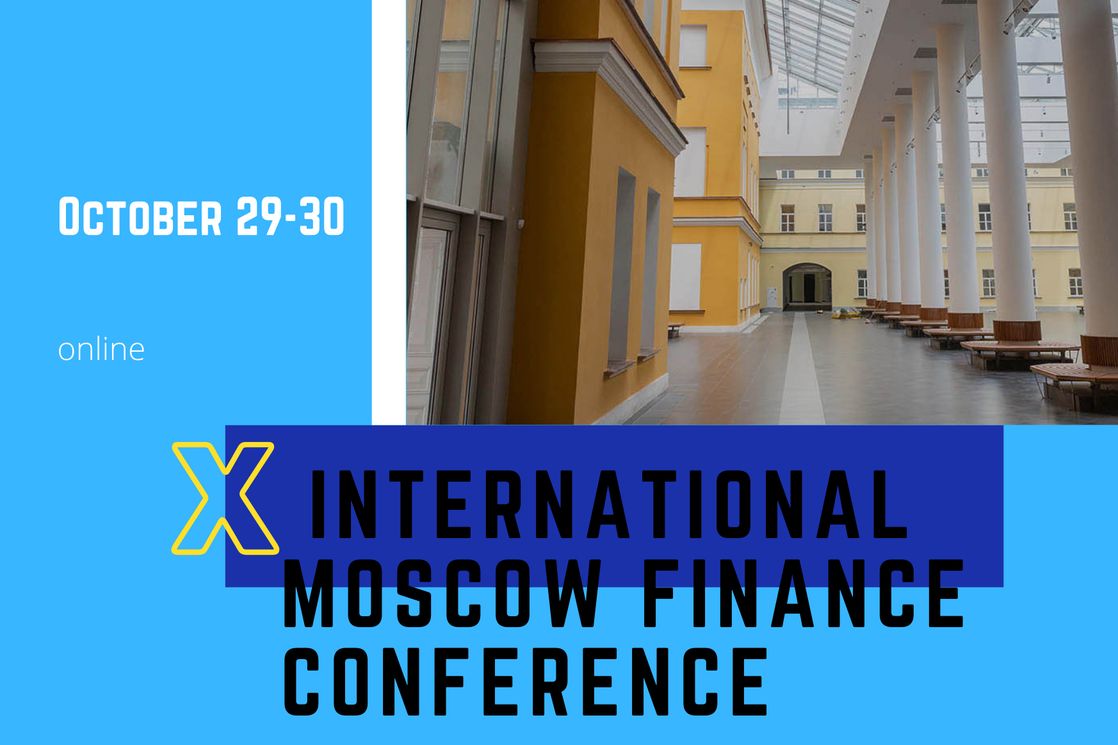X International Moscow Finance Conference
On October 29-30, ICEF will host 10th International Moscow Finance Conference. The annual event brings together the researchers in the field of finance from top international universities and also provides an opportunity for ICEF students to get involved in a cutting edge economic discourse.

The conference is organized by the International Laboratory of Financial Economics (LFE), established jointly with the London School of Economics (LSE).
The conference organizing committee: Vladimir Sokolov (LFE Head), Alexei Boulatov (LFE Academic Advisor) and from LSE Christian Juilliard (LFE Research Coordinator).
Keynote speaker: Christine Parlour (University of California, Berkeley)
Date, time: October 29-30, 16.00-21.00 Moscow time.
Language: English
To connect: registration
Friday, October 29
16.00 Moscow (9 am EST, 14.00 London)

Speaker: Michael Gofman (University of Rochester)
Commit Not to Compete: Collusion versus Liquidity Sharing via Interbank Markets (with Dean Corbae)
Abstract: We provide a simple framework and show empirically that interbank markets can provide a channel for banks to collude in the market for business loans. By lending funds in the interbank market to a competitor, a bank commits not to compete in the private loan market. Interbank interest rates allow banks to split the benefits from such collusion. Using global syndicated loans data, we show that firms paid 31bps higher spread on $239 billion of loans provided by banks that took an interbank loan from a competitor. Our finding has implications for the regulation of interbank markets.
Discussant: Rajkamal Iyer (Imperial College London)
17.00 Moscow (10 am EST, 15.00 London)

Speaker: Janet Gao (Indiana University)
Dirty Money: How Banks Influence Financial Crime (with Joseph Pacelli, Jan Schneemeier, and Yufeng Wu)
Abstract: On September 21st, 2020, a consortium of international journalists leaked nearly 2,500 suspicious activity reports (SAR) obtained from the U.S. Financial Crimes Enforcement Network, exposing nearly $2 trillion of money laundering activity. The event raises important questions regarding what role banks play in facilitating financial crime and the effectiveness of SAR reporting. In this study, we examine the incentives that banks face to report money laundering activity via SAR reports, and the implications of a bank’s reporting strategy for criminal activity. We first analyze banks’ SAR reporting decisions using a stylized model, which predicts that banks facing depressed revenues from their routine business lines and more profit-seeking pressure adopt more lax reporting policies. These reporting policies help to attract criminals, thus increasing the underlying amount of suspicious activities that banks need to examine and report. Empirically, we test the relation between risk-taking incentives and SAR volume at the county level. We find that counties in which banks face higher competition and lower profitability generate higher volumes of SAR activity. These effects are more pronounced for large banks, banks located in high crime areas, and banks that face greater risk-taking incentives vis à vis earnings pressure. We establish causality using shale gas expansion in unrelated states. Consistent with risk-taking incentives influencing SARs, we find that banks experiencing shale growth increases (decreases) generate fewer (more) SAR reports. Overall, our results provide important insights regarding the role of banks in influencing financial crime, and suggest that a bank’s reporting policy has indirect implications for local criminal activity.
Discussant: James O’Donovan (City University of Hong Kong)
Break: 18.00 Moscow (11 am EST, 16.00 London)
19.00 Moscow (12 noon EST, 17.00 London)

Speaker: Rafael Repullo (CEMFI)
Interest Rates, Market Power, and Financial Stability (with David Martinez-Miera)
Abstract: This paper shows the relevance of market power to assess the effects of interest rates on financial intermediaries’ risk-taking decisions. We consider an economy where (i) intermediaries have market power in granting loans, (ii) intermediaries monitor borrowers which lowers their probability of default, and (iii) monitoring is costly and unobservable which creates a moral hazard problem with uninsured depositors. We show that lower safe rates lead to lower intermediation margins and higher risk-taking when intermediaries have low market power, but the result reverses for high market power. We examine the robustness of this result to introducing non-monitored market finance, heterogeneity in monitoring costs, and entry and exit of intermediaries. We also consider the effect of deposit insurance, market power in raising deposits, and funding with both deposits and capital.
20.00 Moscow (1 pm EST, 18.00 London)

Speaker: Dan Bernhardt (University of Illinois and University of Warwick)
Implementing Auction Designs via Market Feedback (with Tingjun Liu)
Abstract: Implementation of optimal mechanisms with heterogeneous bidders is informationally demanding for auctioneers, and the mechanisms invariably employ complex discriminatory winning and payment rules. Our simple, anonymous (non-discriminatory) mechanism imposes minimal information burdens, yet does almost as well. In our second-price auction, bidders submit cash bids and the high bid wins, paying with securities priced by competitive financial markets given the information in the winning cash price. Even with heterogeneity in bidder attributes including size, distribution of expected cash flows, and type of securities used, steeper securities always generate greater revenues, and revenue losses from using our floating-parameter design are small.
Discussant: Alex Boulatov (ICEF, HSE)
Saturday, October 30
16.00 Moscow (9 am EST, 14.00 London)

Speaker: Marcin Kacperczyk (Imperial College London)
Carbon Emissions and the Bank-Lending Channel (with Jose-Luis Peydro)
Abstract: We study how firm-level carbon emissions affect bank lending and, through this channel, real decisions in a sample of global firms with syndicated loans. Using bank-level commitments to carbon neutrality to measure changes in banks’ green preferences, we show that firms with higher (lower) scope-1 emission levels borrowing from banks making commitments subsequently receive less (more) bank credit, even controlling for differences in their fundamentals. The bank decisions to reallocate credit more likely reflect their preferences for green rather than their differential response to an increased business risk. The reduction in bank lending to a brown sector lowers this sector’s real investments but even then, these firms do not improve their environmental scores.
Discussant: Qifei Zhu (Nanyang Technological University)
17.00 Moscow (10 am EST, 15.00 London)

Speaker: Mariassunta Giannetti (Stockholm School of Economics)
Trade Credit and the Stability of Supply Chains (with Nuri Ersahin and Ruidi Huang)
Abstract: We show that firms affected by natural disasters extend more trade credit to their customers, especially if these customers are important and would find it easy to replace the affected firm. The suppliers of affected firms appear to facilitate the trade credit provision by extending more trade credit to the affected firms, especially if the relationship with the affected firm is important for them. Thanks to trade credit provision, supply chains appear to be stable after natural disasters. Customers of affected firms are likely to recur to new suppliers and to sever their relationships with the affected firms only when they do not receive more trade credit, because the affected firms and their suppliers are financially constrained.
Discussant: Emilia Garcia-Appendini (University of Zurich)
KEYNOTE SPEECH - 18.00 Moscow (11 am EST, 16.00 London)

Speaker: Christine Parlour (University of California, Berkeley)
Decentralized Exchanges
Break: 19.00 Moscow (12 noon EST, 17.00 London)
20.00 Moscow (1 pm EST, 18.00 London)

Speaker: Briana Chang (Wisconsin School of Business, UW-Madison)
Risk Concentration and Interconnectedness in OTC Markets (with Shengxing Zhang)
Abstract: We analyze the impact of a regulatory reform in a novel framework that jointly determines banks' bilateral networks and platform access. In our model, banks use their bilateral connections to obtain indirect access to the platform, which saves direct entry costs but results in risk concentration. This trade-off leads to a unique market structure, which is generally asymmetric with multiple layers even if all banks are ex ante homogeneous. Policies that increase balance sheet costs relative to entry costs could result in a more symmetric market structure but have ambiguous effects on transaction costs. Our results underscore that policies aiming to achieve all-to-all trading, reduce risk concentration, or lower transaction costs can be counterproductive.
Discussant: Ye Li (Ohio State University)
21.00 Moscow (2 pm EST, 19.00 London)

Speaker: Vladimir Sokolov (ICEF, HSE)
Money Illiquidity (with Dmitry Livdan, Norman Schurhoff)
Abstract: Disruptions to the payment system cause money to become illiquid. We show both theoretically and empirically that money illiquidity severely impairs economic activity through two channels: firms' direct loss of payment access and a payment network externality that amplifies the initial shock. We develop an equilibrium model in which payment shocks disrupt firms' access to bank-intermediated payment services and propagate upstream through firms' input-output network. Firms' resilience to payment disruptions is captured by the elasticity of the firm's eigenvector centrality to the payment shock. Using 133 million transactions from the Russian payment system, we quantify how payment disruptions spill over to the real economy. A banking panic in 2004 originating from the foreclosure of two mid-sized banks resulted in over 50% of interbank connections being severed, leading to disruptions in firm-to-firm payments that are persistent and asymmetric, hurting payment-sending firms more than payment-receiving firms. We estimate that a payment shock originating at a firm's own/supplier/customer banks reduces firm's revenue growth by 2.5%/3.1%/7%. Upstream/ downstream firms' resilience dampens payment shock pass-through by 0.61/0.26.
Discussant: Michael Gofman (University of Rochester)
LFE Research Coordinator
LFE Head
LFE Research Advisor
ICEF Assistant Professor
Have you spotted a typo?
Highlight it, click Ctrl+Enter and send us a message. Thank you for your help!
To be used only for spelling or punctuation mistakes.


